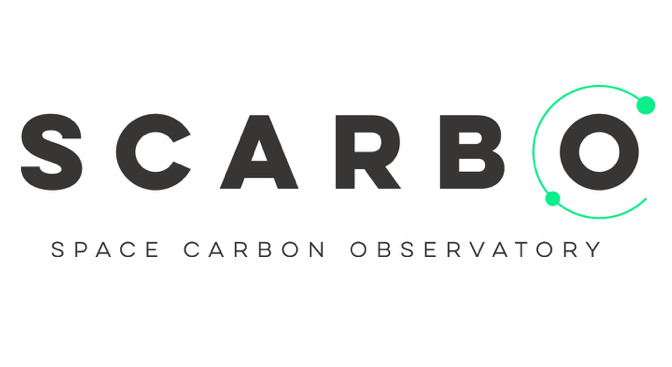SCARBO satellite project for smarter greenhouse gas science has started
UTRECHT/GRONINGEN – The Netherlands will contribute innovative technology and knowledge for measurements of fine particulate matter in the atmosphere (aerosol) in the European project SCARBO that will realize a new constellation of satellites. Space CARBon Observatory covers the development of a future set of small, accurate, groundbreaking satellites for monitoring greenhouse gases from space by ten European parties.
(Dutch follows English)

SRON Netherlands Institute for Space Research is the Dutch scientific institute for research with space instruments. The institute has developed specialist technology (SPEX) for measuring aerosol, which is intended for research into the influence of aerosol on the climate and improving measurements of greenhouse gases.
The aerosol question
Aerosol represents one of the biggest question marks in our knowledge about the climate. It forms the biggest uncertainty factor in research into global climate change caused by humans (IPCC, http://www.ipcc.ch/report/ar5/wg1/). That is because too little is known about the absorption and scattering of sunlight by aerosol in the Earth’s atmosphere and because the effect of aerosol on cloud formation is poorly understood. Furthermore, the presence of aerosol seriously disrupts current measurements of greenhouse gasses.
Aim of SCARBO
The aim of the current SCARBO project is to demonstrate that it is possible to measure the most important greenhouse gases, carbon-dioxide and methane, worldwide and several times per day using a constellation of several dozen small satellites, equipped with new miniature spectrometers that are linked to aerosol sensors and larger reference satellites.
With this approach, Europe wants to improve the accuracy of the measurements and to increase the measurement frequency to several times per day. The European Commission has awarded 2.9 million euros in funding to the SCARBO project for a period of three years from 1 December 2017 onwards for the development of this system.
What the Netherlands will do
SRON Netherlands Institute for Space Research has received 325,000 euros from this funding. SRON will use that over the next three years to work on the scientific requirements for the measurement instruments for SCARBO and to develop models for interpreting combined observations of greenhouse gases and aerosol. SRON will also deliver a prototype called SPEX airborne that, together with prototype greenhouse gas instruments, will perform measurements from a research plane above European pollution sources to demonstrate the feasibility of the combined measurement concept.
If the SCARBO project demonstrates the added value of the intended measurement methods then SRON will develop the aerosol instrument SPEX further, together with Airbus Defence & Space Netherlands, so that it can be used in a constellation of small satellites.
In addition, Airbus Defence & Space Netherlands together with other SCARBO partners will explore the market for the satellite data products from such a constellation.
Not an isolated project
The use of SPEX technology and knowledge for climate science in SCARBO is not an isolated project. In a project called ACEPOL, scientists from SRON, NASA, and other institutes are currently also investigating the performance of SPEX Airborne and other aerosol instruments for future climate satellites with aerosol instruments on board.
In this context there is an interest for the development of SPEX for the NASA PACE (Phytoplankton, Aerosols, Clouds & Ecosystems) mission. And on behalf of ESA, the combination of aerosol and greenhouse gas measurements is being investigated for the European Sentinel-7 satellite.
Nederland helpt antwoord zoeken op aerosol vragen
SCARBO satellietproject voor slimmere broeikasgaswetenschap van start
UTRECHT/GRONINGEN – Nederland gaat vernieuwende technologie en kennis voor metingen van fijnstof in de atmosfeer (aerosolen) bijdragen in het Europese project SCARBO voor een nieuwe constellatie van satellieten. Space CARBon Observatory behelst de ontwikkeling van een toekomstige set kleine, accurate, grensverleggende satellieten voor monitoring van broeikasgas vanuit de ruimte door tien Europese partijen, waaronder SRON Netherlands Institute for Space Research.

SRON is het Nederlandse wetenschappelijke instituut voor onderzoek met ruimte-instrumenten. Het instituut ontwikkelde specialistische technologie (SPEX) voor het meten van aerosolen, bedoeld om onderzoek te doen naar de invloed van aerosol op het klimaat en om metingen van broeikasgassen te verbeteren.
Het aerosol vraagteken
Aerosol vertegenwoordigt een van de grootste vraagtekens in onze kennis op het gebied van klimaat. Het vormt de grootste onzekere factor in het onderzoek naar door de mens veroorzaakte koeling en verwarming van de aarde (IPCC, http://www.ipcc.ch/report/ar5/wg1/). Dat komt doordat de absorptie en verstrooiing van zonlicht door aerosol in de aardatmosfeer onvoldoende bekend is en doordat het effect van aerosol op wolkenvorming slecht bekend is. Bovendien verstoort de aanwezigheid van aerosol op dit moment satellietmetingen van broeikasgassen ernstig.
Doel SCARBO
Het doel van het huidige SCARBO project is aantonen dat het mogelijk is om wereldwijd en meerdere keren per dag de belangrijkste broeikasgassen, koolstofdioxide (CO2) en methaan (CH4), te meten met een constellatie van enkele tientallen kleine satellieten, uitgerust met nieuwe miniatuur spectrometers, die gekoppeld zijn aan aerosol sensoren en grotere referentiesatellieten.
Zo wil Europa de nauwkeurigheid van de metingen verbeteren en de meetfrequentie omhoog schroeven naar meerdere keren per dag. De Europese Commissie honoreert het SCARBO-project, de ontwikkelingen richting dit systeem, vanaf 1 december 2017 voor drie jaar met met 2,9 miljoen euro.
Wat Nederland gaat doen
SRON Netherlands Institute for Space Research ontvangt daarvan 325.000 euro. SRON zal zich daarmee de komende drie jaar buigen over de wetenschappelijke eisen voor de meetinstrumenten voor SCARBO en de ontwikkeling van modellen voor het interpreteren van gecombineerde waarnemingen van broeikasgas én aerosol samen. Ook levert SRON een prototype genaamd SPEX airborne dat samen met prototype broeikasgas instrumenten vanuit een onderzoeksvliegtuig metingen zal gaan doen boven Europese vervuilingsbronnen om het gecombineerde meetconcept aan te tonen.
Als het SCARBO-project de toegevoegde waarde van de beoogde meetmethoden heeft aangetoond, kan SRON samen met Airbus Defence & Space Nederland het aerosol instrument SPEX daadwerkelijk verder ontwikkelen voor toepassing in een constellatie van kleine satellieten.
Daarnaast zal Airbus Defence & Space Nederland samen met andere SCARBO-partners de markt voor de satellietdata-producten uit zo’n constellatie verkennen.
Niet op zichzelf
De toepassing van SPEX technologie en kennis voor klimaatwetenschap in SCARBO staat niet op zichzelf. Binnen een project met de naam ACEPOL onderzoeken wetenschappers van SRON, NASA en andere instituten momenteel ook de prestaties van SPEX Airborne en andere aerosolinstrumenten, met het oog op toekomstige klimaatsatellieten met aerosolinstrumenten.
In dit kader is er interesse voor de ontwikkeling van SPEX voor de NASA PACE (Phytoplankton, Aerosols, Clouds & Ecosystems) missie. Verder wordt de combinatie van aerosol- en broeikasgasmetingen in opdracht van ESA onderzocht voor de Europese Sentinel-7 satelliet.


